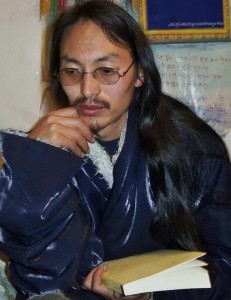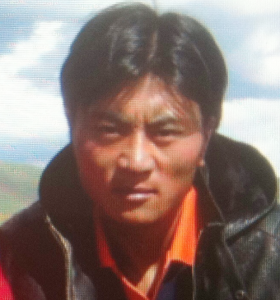
A popular Tibetan writer and four others have been sentenced to prison early this month by Chinese authorities in Nyagchu (Ch: Yajiang) County in Kardze (Ch: Ganzi) Tibetan Autonomous Prefecture, Sichuan Province.
On 1 August 2013, the County People’s Court in Nyagchu County sentenced the writer, Gangkye Drupa Kyab, to five years and six months in prison for alleged political activities. Four other Tibetan men were also sentenced. Samdup received five years’ prison term while Sheygyal and Yudrang each were sentenced to two years. Drensel received three years prison sentence, according to information obtained by Tibet Express, an exile Tibetan newspaper.
All of them were sentenced for allegedly being members of a secret political group called “Marshog Ngogol Tsogpa” (Anti-Communist Party Association). Both Samdup, 32, and Yudrang were detained on 13 June 2012.
Gangkye Drupa Kyab, 34, and a father of two, was first detained on the night of 15 February 2012 by a group of about 20 Public Security Bureau (PSB) officers from his home in Serta (Ch: Seda) County. His house was raided and his wife, Wangchuk Lhamo, was given no explanation despite repeated appeals at the time of detention. Since then, the whereabouts of Gangkye Drupa Kyab remained unknown to family and friends until his sentencing early this month. For 17 months, he was detained incommunicado with the PSB releasing no information about his whereabouts or condition.

Gangkye Drupa Kyab was born in Gephen Village of Ragtam Township in Kardze Tibetan Autonomous Prefecture. He attended primary school in Ragtam Township and middle school in Serta County. After completing a teacher-training course in Kardze County, he worked as a teacher in Dartsang and Horshul townships. At the time of his arrest, he was working as a teacher at a school founded by Khenpo Tsultrim Lodoe in Drango (Ch: Luhuo) County in Kardze. In addition to being a teacher, he was a prolific writer. Among his many writings, one of the most well known is the book titled “Sajhi Tragdi Marpo” (Blood Letters of 2008) which was published by exile Tibetans in India. The book detailed the violent repression of 2008 protests in Tibet contradicting official accounts touted in Chinese state media. He also wrote the book, ‘De Dhon Ghi Mikchu’ (Tears of the Past).
TCHRD strongly condemns China’s ongoing crackdown on legitimate dissent and opposition, which violates the right to freedom of expression and opinion. The Centre calls on the Chinese authorities to respect its own constitution as well as international human rights law, which provide freedom of expression to all without discrimination. In particular, under international law, no exception is allowed in derogating the right to hold opinions. In its General Comment No. 10 on the right to freedom of expression as provided in article 19 of the International Covenant on Civil and Political Rights (ICCPR), the Human Rights Committee states: “Paragraph 1 requires protection of the ‘right to hold opinions without interference’. This is a right to which the Covenant permits no exception or restriction.”
